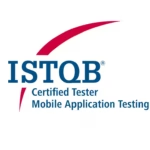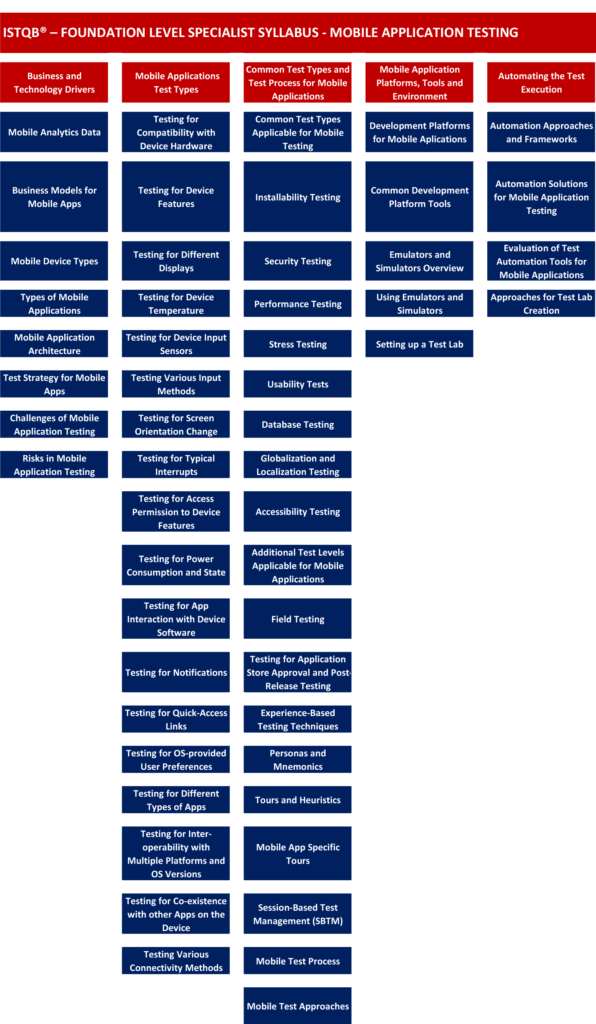Course overview
 The ISTQB Certified Mobile Application Tester (CT‑MAT) is a 2-day accredited course designed for professionals involved in mobile application testing across a wide range of devices and platforms. It prepares testers to implement effective test strategies, address mobile-specific challenges such as network variability, and apply mobile application security testing techniques.
The ISTQB Certified Mobile Application Tester (CT‑MAT) is a 2-day accredited course designed for professionals involved in mobile application testing across a wide range of devices and platforms. It prepares testers to implement effective test strategies, address mobile-specific challenges such as network variability, and apply mobile application security testing techniques.
Read More
Whether you’re working on native, hybrid, or web mobile apps, this certification helps you build expertise in usability, performance, compatibility, and security testing. Based on the latest ISTQB syllabus and delivered by accredited trainers, the course is ideal for testers looking to formalise their knowledge and earn a globally recognised qualification in ISTQB mobile application testing.
Course highlights
- Duration: 2-day intensive training (9am – 5pm)
- Format: available as Live Virtual Classroom
- Content: aligned with the ISTQB Mobile Application Testing syllabus; covers mobile strategy, app environments, performance, usability, compatibility, and security testing
- Exam preparation: includes mock exam questions, sample scenarios, and structured review sessions
- Accreditation: fully accredited by UKITB on behalf of ISTQB
- SFIAplus level: rated at Level 3 by BCS
- Assessment: 40 multiple-choice questions in 60 minutes (75 minutes for non-native English speakers); 65% pass mark required
Why you should attend
- Earn an ISTQB-recognised credential in mobile application testing
- Build hands-on skills in mobile application security testing, performance, and usability
- Understand platform diversity, network conditions, and user contexts in mobile testing
- Gain confidence working across Agile, DevOps, and CI/CD environments
- Boost your employability in QA teams delivering mobile apps
Who should attend
- QA professionals and testers working in or transitioning to mobile application testing
- Security-conscious testers seeking to add mobile application security testing to their skillset
- Test analysts preparing for the ISTQB Mobile Application Testing (CT-MAT) certification
- Candidates with an ISTQB Foundation Certificate looking to advance in mobile QA roles
Next steps in your testing career
Holders of this certification may progress to further ISTQB qualifications, such as Advanced Level Test Manager, Technical Test Analyst, or Test Automation Engineer within the Core stream. Those focusing on Agile can advance to the Agile Technical Tester (CTAL-ATT), while Specialist certifications such as Security Testing provide opportunities to deepen expertise in specific domains.
Watch our latest webinar
Gain a clear understanding of what the ISTQB Mobile Application Testing course covers in this short video. You’ll explore the key methods, techniques, and tools used by professionals to test mobile apps effectively.
The video also touches on business and technology drivers, mobile platforms, common test types, and how automation supports mobile test execution. Click here to watch the webinar recording.
Read Less
Entry requirements
The ISTQB® Certified Tester Foundation Level (CTFL) certificate must be obtained before taking this exam.
Exam
The Mobile Application Testing Foundation Level exam is multiple choice. There are 40 questions. To pass the exam, at least 65% of the questions (i.e., 26 questions) must be answered correctly. Hands on objectives and exercises will not be examined.
- Exam is included in the price
Learning objectives
Certified Mobile Application Testers who have passed the Foundation Level “Certified Mobile Application Testing” exam should be able to accomplish and demonstrate the following Business Objectives:
- Understand and review business and technology drivers for mobile apps in order to create a test strategy
- Identify and understand the key challenges, risks and expectations associated with testing a mobile application
- Apply test types and levels specific to mobile applications.
- Apply common test types, such as those mentioned in ISTQB® Certified Tester Foundation Level syllabus 2018, in the mobile specific context.
- Carry out the activities required specifically for mobile application testing as part of the main activities of the ISTQB® test process.
- Identify and use suitable environments and appropriate tools for mobile application testing.
- Understand methods and tools specifically to support mobile application test automation.
Certified Mobile Application Testers should be able to demonstrate their skills in the following areas:
- Describe how available mobile analytics data can be used as input for the test strategy and the test plan.
- Distinguish between various business models for mobile applications.
- Recall different types of mobile devices.
- Distinguish between different types of mobile applications.
- Distinguish between general architecture types of mobile applications.
- Apply characteristics and specifics of the mobile market in preparing a test strategy.
- Give examples of the challenges associated with testing mobile applications.
- Describe how risks specific to mobile applications may be mitigated.
- Describe device-specific features and hardware which should be considered for testing.
- Prepare tests for the app’s compatibility with screen sizes, aspect ratio, and screen density.
- Describe how tests can show the potential effects of device overheating on the system under test.
- Recall different test types for testing of the various input sensors used in mobile devices.
- Recall tests to be run for various input methods.
- Describe how tests can reveal user interface issues when changing screen orientation.
- Prepare tests for an app using typical mobile device interrupts.
- Prepare tests for changing the access permissions to the device features requested by the app.
- Prepare tests to verify the impact of an app on a device’s power consumption and the impact of its power state on the app.
- Prepare tests for the handling of notifications by the system under test.
- Describe how tests can verify correct functionality of quick-access links.
- Prepare tests for the impact on an app of the user preference settings provided by an operating system.
- Distinguish between different tests required for native, web and hybrid applications.
- Recall tests required for apps which are available on multiple platforms or operating system versions.
- Recall tests required for co-existence and interoperability with other apps.
- Summarize the tests for connectivity testing, including those across networks, when using Bluetooth and when switching to flight mode.
- Prepare Installability tests for mobile apps.
- Prepare stress tests for mobile apps.
- Give examples of security issues related to mobile apps.
- Recall time and resource behaviour considerations for mobile apps.
- Prepare usability tests for mobile apps.
- Recognise the type of tests required for database testing of mobile apps.
- Summarise the tests required for internationalization (globalization) and localization testing of mobile apps.
- Summarise the need for accessibility testing in mobile application testing.
 The ISTQB Certified Mobile Application Tester (CT‑MAT) is a 2-day accredited course designed for professionals involved in mobile application testing across a wide range of devices and platforms. It prepares testers to implement effective test strategies, address mobile-specific challenges such as network variability, and apply mobile application security testing techniques.
The ISTQB Certified Mobile Application Tester (CT‑MAT) is a 2-day accredited course designed for professionals involved in mobile application testing across a wide range of devices and platforms. It prepares testers to implement effective test strategies, address mobile-specific challenges such as network variability, and apply mobile application security testing techniques. 














Marc Ackermans|| –
I couldn’t hope for a better trainer! Being a non English native speaker I was afraid the course would have been a big challenge but Angelina has made this course for me easy to understand making sure I wasn’t left behind. She has clarified each doubt and on top of that she’s also good fun. I hope I will meet Angelina in a future course.
Mark Whitby|Head of Development and Testing|InHealth Intelligence –
Course was excellent. The trainer was energetic and engaging.
Madelaine Helleur O’Connor|Graduate Data and Technology Consultant|KPMG –
I was very happy with the way the course was presented._x000D_
By asking everyone questions during the course Angelina made sure we all stayed focused (at lease it worked for me).
Kieran Hooper|Business Consultant|IBM –
The course is quite clear, sometimes a bit internet connection issue. The content is quite good
Joshua Lovejoy|Test Analyst|University of Southampton –
Angelina was very knowledgeable and presented the course with lots of energy and humour.
Colin McNairney|Test Automation Specialist|IBM UK –
Course was very good, but difficult for me to follow as I am deaf in both ears and had difficulty keeping up with what was going on. I depend mainly on text and slides, but suffered some confusion as I did not have context in some situations.
Thomas Collins|Software Tester|Aareon –
Angelina was very friendly and approachable, she was happy to answer any queries that I had as we went along. I was initially a bit worried about remote learning, but things went very well. Angelina tried to make the course as interactive as possible, even though I know that it is hard to do this remotely. Thanks Angelina 🙂
Sophie Pearson|PTP Business Analyst|Old Mutual Wealth –
It is very informative and allowed you to highlight the areas that you need to study in more detail for the exam. At times we would get lost in the practical that doesn’t relate back to the exam
George Selway|Software Tester Apprentice|Sedgemoor District Council –
It was easy to follow and the instructor was very friendly and patient. There was a great case study to follow with linked tasks.
George Selway|Software Tester Apprentice|Sedgemoor District Council –
It was easy to follow and the instructor was very friendly and patient. There was a great case study to follow with linked tasks.
Duncan MacGregor|IT Technician|OS –
Course was excellent, well paced, superb instructor and feel like I learned a lot.
Darrell Cole|QA|Moneyhub –
Good overview plenty to learn lots of Fun
Attila Pal|Data administrator|Randstad –
I had a virtual course between 18-20 May and really enjoyed it. I had already prepared from a book but John, the trainer, helped me with topics I was not confident in. In my opinion, the course was well structured and interactive enough – we had optimal break times, practiced sample questions, had explaining discussions and Q-A sessions all 3 days. It was better than just reading the book, I understood the material more because of visualising and pointing out the major correlations. I took my exam 2 days after this course and had 90% (probably around 20-25% more than if preparing from the book only)!
Anonymous –
Really interesting course and great trainer. Small group was nice.
Anonymous –
I thought the course was very easy to follow and Rosie ensured that everyone was involved and understood what was going on by getting people to explain their real life situations and how theyre applicable to the objectives of the course.
Anonymous –
Really interesting course and great trainer. Small group was nice.
Anonymous –
I thought the course was very easy to follow and Rosie ensured that everyone was involved and understood what was going on by getting people to explain their real life situations and how theyre applicable to the objectives of the course.
Joe Verlander | Software Tester | PwC –
Enjoyable – sadly online and not in person
Iulia Olaru| Test Engineer Apprentice – Functional tester| IBM –
I really enjoyed the course, although it was fast paced, every topic was covered and explained perfectly with plenty of practical exercises.
Nithya Anantharaman| Test Manager| KPMG UK –
The course certainly covers the basics – all different areas specific to mobile testing, would have been more insightful to see an application of this perhaps via a case study.